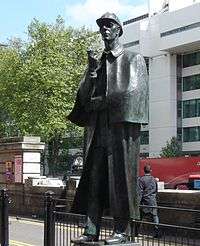Statue of Sherlock Holmes, London
 | |
| Artist | John Doubleday |
|---|---|
| Year | 1999 |
| Type | Pedestrian statue |
| Medium | Bronze |
| Subject | Sherlock Holmes |
| Location | London |
| 51°31′21″N 0°09′24″W / 51.52250°N 0.15659°WCoordinates: 51°31′21″N 0°09′24″W / 51.52250°N 0.15659°W | |
The statue of Sherlock Holmes in London, sculpted by John Doubleday, stands near the site of the fictional detective's home at 221B Baker Street. Unveiled on 23 September 1999, it was funded by the Abbey National building society, whose headquarters were on the supposed site of the famous address. As no site was available on Baker Street itself the statue is outside Baker Street tube station, on Marylebone Road. Doubleday had previously produced a statue of Holmes for the town of Meiringen in Switzerland, below the Reichenbach Falls from which the detective fell to his death in the story "The Final Problem".
Description
The 3-metre-high (9.8 ft) statue depicts Holmes wearing an Inverness cape and a deerstalker and holding a pipe, attributes first given to him by Sidney Paget, who illustrated Arthur Conan Doyle's stories for The Strand Magazine.[1] It is located outside Baker Street tube station on Marylebone Road, near both the detective's fictional home at 221B Baker Street and the Sherlock Holmes Museum between numbers 237 and 241.[2]
History
Before London received its statue of Sherlock Holmes examples had already been placed in Meiringen, in Japan[3] and in Edinburgh, this last marking the site of Conan Doyle's birthplace.[4] In 1927 G. K. Chesterton was the first person to suggest that a statue of Holmes be sited in London, but his efforts came to nothing.[5] A new campaign was begun by the Sherlock Holmes Society of London in 1996.[5] Before then the society had, according to its president Anthony Howlett, spent "a decade or two debating whether we should put a statue smack in the middle of Baker Street, and the traffic be damned".[2] The Sherlock Holmes Statue Company Limited was set up to manage the project. In 1998, Abbey National agreed to fund the statue because of their connection with Holmes. (Their headquarters were at 215−229 Baker Street and they employed a member of staff to respond to any letters addressed to Holmes at 221B.)[5]
John Doubleday, the sculptor of the first statue of Holmes at Meiringen, was given the commission for the London statue on 31 March 1998.[5] After the plans to install the statue were announced some local residents and the St Marylebone Society spoke out against the work, saying that it was "not very appropriate. It should have been in Baker Street itself, which is much quieter."[1] The statue was unveiled by Lord Tugendhat, the chairman of Abbey National, on 23 September 1999.[5]

Since 2014, Doubleday's sculpture has been one of a series of "Talking Statues" across London where passers-by can receive a simulated telephone call from the statue's subject by scanning a QR code or visiting a link. The Holmes statue is voiced by the actor Ed Stoppard with a script written by the English novelist Anthony Horowitz which humorously gives details related to the statue's appearance.[6]
References
- 1 2 Watson-Smyth, Kate (21 February 1999). "Sherlock Holmes and the mystery of the missing statue is solved". The Independent. Retrieved 6 January 2013.
- 1 2 Reid, T.R. (22 September 1999). "Sherlock Holmes honored with statue near fictional London home". The Washington Post. Retrieved 6 January 2013.
- ↑ "The Statue of Sherlock Holmes in Japan". Japan Sherlock Holmes Club. Retrieved 7 January 2013.
- ↑ "Sherlock Holmes statue reinstated in Edinburgh after tram works". BBC News. 22 August 2012. Retrieved 7 January 2012.
- 1 2 3 4 5 Horrocks, Peter. "The Statue of Sherlock Holmes at Baker Street Station". The Sherlock Holmes Society of London. Retrieved 6 January 2013.
- ↑ "Talking Statues London : SHERLOCK HOLMES". www.talkingstatueslondon.co.uk. Retrieved 2016-09-29.